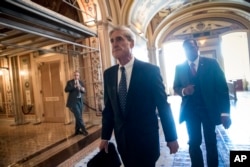Carter Page, a foreign policy adviser to Donald Trump as he ran for president last year, told campaign aides he had gained "incredible insights" from Russian lawmakers and "senior members" of President Vladimir Putin's administration when he made a trip to Moscow in the midst of the U.S. election.
Page wrote in a July 2016 email to Trump campaign aides that Deputy Prime Minister Arkady Dvorkovich "expressed strong support for Mr. Trump and a desire to work together toward devising better solutions in response to a vast range of current international problems," according to a transcript of more than six hours of testimony Page gave last week before a House of Representatives committee investigating Russian interference in the U.S. election.
Asked about the email, Page told lawmakers he did not mean that he had met with officials, but rather had learned of their views in local media, from scholars in Russia and at a public speech given by Dvorkovich at a conference where Page was also speaking.Page said he had a "brief hello" with Dvorkovich.
Page's Russian contacts have become one focus of congressional investigations into what the U.S. intelligence community concluded was a campaign led by Putin to undermine U.S. democracy and help Trump win.
In addition, special counsel Robert Mueller is conducting a criminal probe of the Russian meddling in the campaign and whether Trump obstructed justice by firing James Comey, a former director of the Federal Bureau of Investigation, when he was heading the agency's Russia investigation before Mueller, over Trump's objections, was appointed to take over the probe.
Another Trump foreign affairs adviser, George Papadopoulos, last month pleaded guilty to lying to federal investigators about his contacts with Russian interests and his communications with Trump campaign aides.Papadopoulos has been cooperating with investigators in their months-long probe.
The lead Democrat on the House Intelligence Committee, Congressman Adam Schiff, said Page's public remarks prior to his appearance before the panel that his trip to Moscow was as a private citizen were undercut by his congressional testimony.
"He sends a memo saying that in a private conversation basically that I had with the deputy prime minister and others in the presidential administration and member of the Duma, I gained important insights and outreach that I want to share with the campaign," Schiff said, "completely at odds with what he had been saying publicly."
Schiff called the Russian links to Papadopoulos and Page two parallel efforts by the Trump campaign to make contacts with Russian interests.
"You have them both reporting back to the campaign, you have the campaign deceiving the public about their knowledge of these things," Schiff said."So I hardly think that these are coincidental."
The House Intelligence panel, in a closed-door session on Tuesday, is questioning Keith Schiller, Trump's former head of Oval Office operations, until he left in September.
Lawmakers are expected to ask Schiller what he knows about Trump's 2013 trip to Moscow and a 35-page dossier that a former British intelligence officer wrote about Trump's behavior on the trip to visit the Miss Universe pageant.
Research for the dossier, which Trump has derided, was funded by the campaign of Trump's 2016 opponent, Democrat Hillary Clinton, and the Democratic National Committee.





